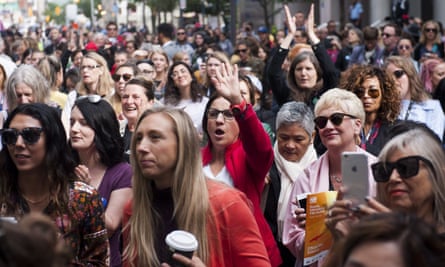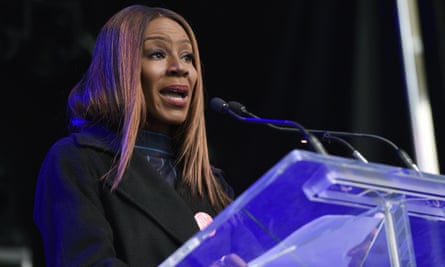On the third day of the Toronto film festival (Tiff), business appears to be booming. The queues for the press and industry screenings speak to that. But a few feet from the main venues, a section of John Street has been converted into what looks more like a music festival than a trade convention. There’s artificial grass covering the tarmac, and a stage where singer Shakura S’Aida is leading the crowd in a chant of “use your voice, use your voice”.
The event is a rally in support of women in film, part of Tiff’s Share Her Journey initiative, which was set up in 2017. The object of Share Her Journey, Tiff executive director Michele Maheux explained in her introduction, was not just to “celebrate and lift up women everywhere” but to find “solutions to the gender parity problems that are rampant in the film industry.” Well, she shrugs. “What a difference a year makes.”
While the statistics about the lack of gender and race inequality in the film industry were broadly circulated when Share Her Journey was formed, the past 12 months, following the Harvey Weinstein revelations, have crystallised the issue. As Maheux said, this period has “not been without pain but the sisterhood that emerged reminds us that we are not alone”. From the Oscars to Cannes, the argument for gender parity is now an essential part of any film industry event. Even at Venice, where diversity was notable for its absence. We must be closer to finding those solutions, the logic goes, because now we can finally be honest about the problems.

Nine more speakers followed Maheux’s introduction, all addressing different aspects of the issue at hand. Themes included the importance of intersectionality, the dispiriting quality of statistics and the social value of sharing women’s stories. Geena Davis spoke about her work to counter the “unconscious bias” that limits female representation in children’s film and TV. Conscious bias is next she says: a far more difficult problem to fix. Actor Mia Kirshner, co-founder of #aftermetoo, proposed systems to make it easy for women to seek the assistance they need when reporting workplace sexual harassment.
Director Amma Asante delivered a very powerful speech about the realities of working in the film industry as a black woman, and shared her dream “to live in a world where a woman creative didn’t have to stand on a platform about equality”. Actor Amanda Brugel confessed that she was thrilled to work with so many female film directors, “but the most exciting thing is to look across and see a female cinematographer – or even a female grip!”
Davis estimated the audience as “about half men”, to a loud cheer, which was probably a more than generous estimate. The ratio of women to men in the crowd certainly appeared to be higher than that in the screenings rooms, despite Share Her Journey’s concerted efforts to promote diversity at the festival. Inspirational as the speeches were, there remains a niggling question: was this event a catalyst for change, or just a case of preaching to the converted?

Photograph: Chris Pizzello/Invision/AP
The answer surely is that at this point we should all be converted. If the past year hasn’t deepened your understanding of the obstacles that women, especially women of colour, face in the film industry, you haven’t been paying attention. The point of the Share Her Journey rally, it seemed, was to do more than put the issue of gender parity on the table. First and foremost, it was a place to share tactics and resources, from producer and executive Cathy Schulman’s “roadmap to radicalisation”, to Brugel’s mobilisation tips.
More than that though, the rally marked a pause for thought in the business of the festival. A few hundred delegates left the queues and the screening rooms behind and walked on to the artificial grass to listen to the experiences of other women. And perhaps, to say that the business cannot or should not go on, until the industry stops to listen too. As academic Dr Stacy L Smith said: “Our North Star is not diversity, it is not inclusion, it is belonging.”
